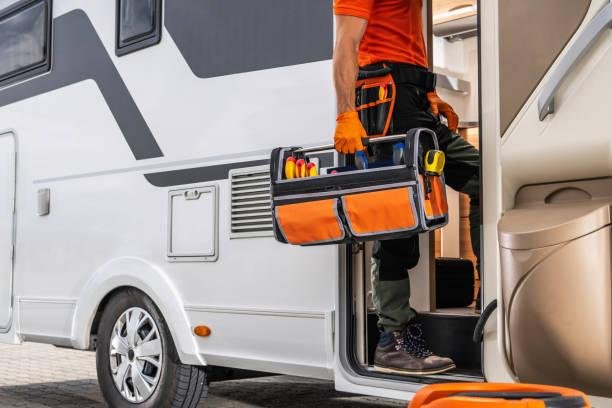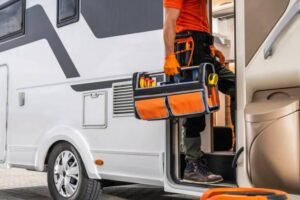Owning an RV opens the door to incredible adventures, allowing you to explore new places, embrace nature, and travel with the comforts of home. However, life on the road can be unpredictable, and even the most well-maintained RV can encounter mechanical problems or other unexpected issues. To ensure you’re always prepared, it’s essential to carry the right tools with you.
In this article, we will explore the essential tools every RV owner should have on hand for road trips. From mechanical fixes to campsite needs, these tools will help you stay ready for anything.
1. Basic Tool Kit
A basic tool kit is the foundation of any RV maintenance arsenal. It should contain a variety of commonly used tools that can help you with repairs, adjustments, or minor fixes. At a minimum, your tool kit should include:
- Screwdrivers (both flathead and Phillips)
- Pliers (needle-nose and standard)
- Adjustable wrench
- Socket wrench set
- Allen wrench set
- Tape measure
- Hammer
- Utility knife
These tools will cover most everyday repairs and adjustments in your RV, from tightening loose screws to fixing small parts that come loose over time.
2. Tire Pressure Gauge and Inflator
Tires are one of the most critical components of your RV, and maintaining proper tire pressure is essential for safety and fuel efficiency. An underinflated tire can lead to blowouts or reduce the handling of your RV, especially during long drives.
A tire pressure gauge will allow you to monitor your tire pressure before hitting the road and ensure it’s within the recommended range. In case the pressure is low, a portable tire inflator is invaluable for adding air to your tires quickly and easily. Many RVers also carry a digital tire pressure monitoring system (TPMS), which provides real-time updates on tire conditions.
3. Jack and Lug Wrench
A flat tire can happen anytime, and being prepared to change a tire is crucial when traveling in an RV. A heavy-duty jack that can support the weight of your RV is essential for raising the vehicle safely. Additionally, a lug wrench will help you loosen and tighten the nuts on your RV’s wheels.
If you’re unsure how to change a tire on your RV, it’s a good idea to practice at home before heading out on the road. Make sure the jack and lug wrench you carry are appropriate for the size and weight of your RV.
4. Multimeter
An electrical multimeter is a handy tool for diagnosing electrical problems in your RV. Whether you’re dealing with a faulty battery, malfunctioning appliances, or issues with the wiring, a multimeter allows you to measure voltage, current, and resistance. It can help identify the source of electrical problems, so you can make quick repairs before they worsen.
Given how much of your RV’s systems rely on electricity—such as lights, water pumps, refrigerators, and heating—a multimeter is an indispensable tool for ensuring everything functions properly.
5. Duct Tape and Electrical Tape
There’s a saying that duct tape can fix almost anything, and that holds true for RVs. Duct tape is incredibly versatile and can temporarily repair leaks, cracks, and tears, from loose awnings to cracked hoses. It’s an easy and reliable fix for unexpected damage until you can get a permanent solution.
Electrical tape is similarly useful for quick fixes on exposed or damaged wires. In case you experience minor electrical issues, wrapping wires in electrical tape can prevent dangerous short circuits or further damage until you can complete a more thorough repair.
6. Zip Ties and Bungee Cords
Zip ties and bungee cords are lightweight but strong, making them perfect for securing loose items, organizing cables, and even holding things together during travel. They come in handy for a variety of tasks, such as securing hoses, hanging tarps, or keeping items in place while you’re on the move.
Having an assortment of zip ties and bungee cords in different sizes ensures you can address various needs while camping or on the road.
7. Spare Fuses and Light Bulbs
Your RV has a variety of fuses that protect electrical components, from your interior lights to your water pump. A blown fuse can lead to non-functioning systems, which may range from minor inconveniences to major problems. Always carry a spare fuse kit with different amperages that match your RV’s electrical systems.
Similarly, spare light bulbs are a must, especially for interior lighting and headlights. Having replacements on hand will save you the trouble of searching for a store while you’re on the road or setting up camp.
8. Water Pressure Regulator
Campgrounds and RV parks often have varying water pressure levels, and high pressure can damage your RV’s plumbing system. A water pressure regulator helps prevent this by controlling the pressure before it enters your RV. Simply attach the regulator to the water hose when you connect to a city or campground water source.
This small tool can prevent costly repairs to your pipes, faucets, and other water-related systems.
9. Water Hose and Sewer Hose
An RV’s water system is a key feature for convenience and comfort, but to ensure it works properly, you’ll need a reliable drinking water hose. This hose connects your RV to an external water supply and should be designated for potable water only. Choose a hose that’s durable, kink-free, and long enough to reach water hookups at campsites.
In addition, a sewer hose is critical for dumping waste from your RV’s holding tanks. Make sure to carry a high-quality hose that’s designed for RV use, along with necessary accessories like hose supports and adapters for different dump station connections.
10. Leveling Blocks
Parking on uneven ground can cause a range of problems in your RV, from uneven walking surfaces to poor operation of appliances. Leveling blocks are stackable blocks that allow you to level your RV when parked on sloped or uneven surfaces. This helps to keep your RV stable and ensures that systems like your refrigerator function properly.
Using leveling blocks can also improve the comfort of your sleeping area and keep cabinets and doors from swinging open unintentionally.
11. Cordless Drill
A cordless drill is another must-have tool for RV owners. It’s not only great for driving screws and drilling holes but also handy for lowering and raising stabilizer jacks quickly. A cordless drill with a variety of bits can save time and effort when setting up camp or making minor repairs around your RV.
Make sure to keep the batteries charged, and consider carrying an extra battery for longer trips.
12. Fire Extinguisher
Safety should always be a top priority when you’re on the road, and a working fire extinguisher is essential. Fires can start unexpectedly from cooking, electrical issues, or other hazards. Having a fire extinguisher on hand allows you to act quickly and prevent a small fire from becoming a dangerous situation.
Check that your RV’s fire extinguisher is properly charged and within its expiration date. It’s a good idea to have more than one fire extinguisher in different areas of your RV, such as near the kitchen and sleeping areas.
13. First Aid Kit
An accident or injury can happen at any time, whether you’re on the road or camping. A first aid kit equipped with bandages, antiseptics, gauze, pain relievers, and other essentials ensures that you’re prepared to address minor injuries or medical emergencies. Keep the kit easily accessible in case of an emergency.
Conclusion
Traveling in an RV offers the thrill of adventure, but it’s crucial to be prepared for the unexpected. By carrying these essential tools, you’ll be able to handle minor repairs, prevent major issues, and keep your trip running smoothly. Whether you’re tackling a flat tire, fixing an electrical problem, or leveling your RV at a campsite, having the right tools on hand gives you the confidence to handle whatever comes your way.
With proper preparation, you can fully enjoy the freedom and excitement of RV life without worrying about unexpected challenges. So, before you hit the road, make sure your toolbox is well-stocked with the essential items mentioned above!







More Stories
Urgent Care Billing Services and Revenue Cycle Management
iPhone Screen Repair Near Me: How to Find
South America Pulse Oximeters Market Witness Highest Growth at a CAGR of 6% by 2028